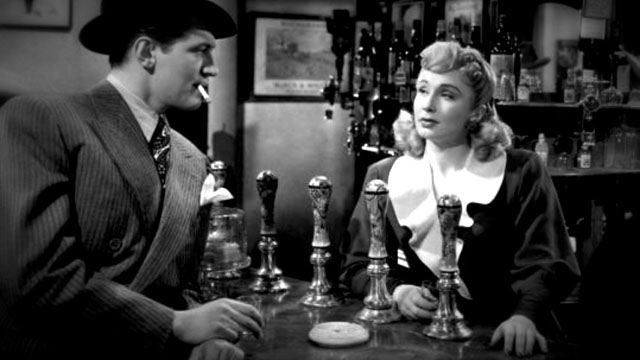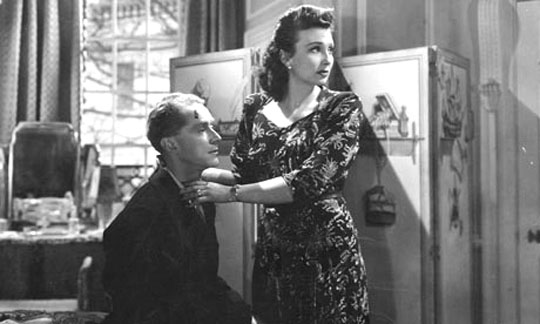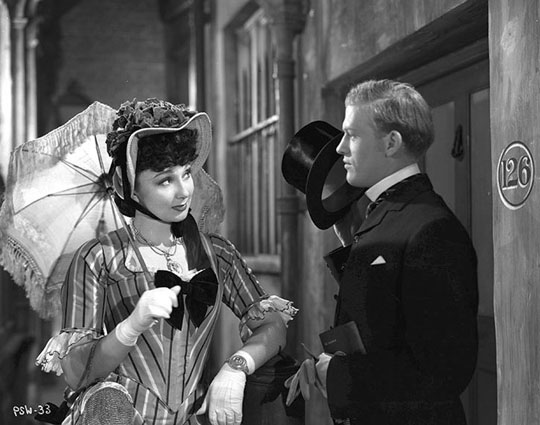Googie Withers (1917-2011)

Sad news this weekend. The inimitable Googie Withers has died at the age of 94 after a long and varied career in film, theatre and television.
Although she worked with directors like Alfred Hitchcock (a small part in The Lady Vanishes [1938]), Michael Powell (a member of the resistance in One of Our Aircraft Is Missing, [1942]) and Jules Dassin (Night and the City [1950]), and had a continuing role on the London Weekend Television series Within These Walls in the mid-’70s, for me her key performances remain those she gave for Robert Hamer in three great Ealing films: Dead of Night (1945), Pink String and Sealing Wax (also 1945) and It Always Rains On Sunday (1947).
Googie Withers was not a conventionally beautiful movie star; what she had was a powerful personality projecting a mature sexuality, which in these three roles was pitted against weak men and the strictures of a society reluctant to accommodate that sexuality.

In Hamer’s Haunted Mirror episode of Dead of Night, she plays Joan, a strong independent woman who presents her fiance with an antique mirror. The mirror turns out to be possessed by its former owner, a bitter crippled man who a hundred years earlier murdered his wife in a fit of jealousy, then slit his own throat while sitting in front of it. Peter (Ralph Michael) is quickly taken over by the malevolent spirit in the mirror; all he can see in the reflection is the room where the murder took place. Unable to tear himself away, he finally attacks Joan in a jealous rage and she just manages to smash the mirror as he’s strangling her, breaking the curse. The man has no power here; only the woman is capable of reestablishing reality.

In the same year’s Pink String and Sealing Wax, set in late Victorian Brighton, she plays Pearl Bond, the wife of a drunken, abusive public house landlord. In an attempt to escape the stifling confines of her life, she makes use of the son of a rigidly moralistic pharmacist, a naive young man who, in rebelling against his father’s domination, becomes infatuated with her. When the police become suspicious of her husband’s death, Pearl tries to blackmail the pharmacist by threatening to drag his son’s name into the case unless he gives evidence that he found no poison in the body. When the man refuses, she commits suicide, the only way out for her in that restrictive society.

Best of all is It Always Rains on Sunday, an unusual Ealing “noir”, in which she plays Rose Sandigate, the second wife of a working class East End man with two teenage daughters. Rose is disliked by the girls, whose lack of respect triggers a shrewish bitterness in her. One Sunday, her dissatisfaction with this safe but cramped life is brought to a head when her former lover, Tommy Swann (John McCallum), just escaped from prison, turns up looking for shelter. Juggling her family responsibilities with the dangers of keeping him hidden from both the family and the police (who know of her connection with Swann), she has to face both her desires and the hopeless future she would face with the fugitive Swann. The tension and rich atmosphere of the film only falter in the final stretch when focus shifts away from Rose for a long nighttime chase sequence as the police corner Swann in some railway yards, leaving the coda in which Rose’s husband forgives her and accepts her back, and in which she apparently accepts the constrained security of her marriage, not entirely satisfying. As in the final scene of Nicholas Ray’s Bigger Than Life, it’s difficult to take this restoration of “normality” at face value. Googie Withers has shown us a woman whose passions will obviously strain against the life in which she seems destined to remain, no matter how pleasant and understanding the man she lives with.
In all three of these films, Googie Withers is the physical and emotional centre of the narrative and her presence is what ultimately gives Hamer’s bleak visions of stifling British society their power.
Comments